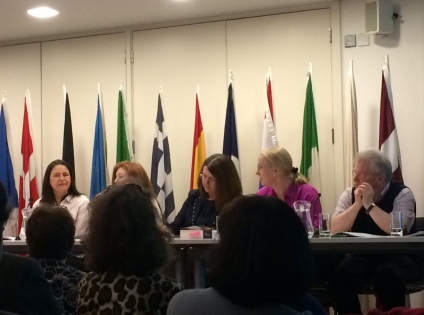Tags
CAT tools, CIoL, CPD, European Commission in the UK, European Translator Survey, ITI, London, Multiterm, Networking, Professional translator, Studio 2017, Trados, Trados Studio, Training, Translation

It’s now just over a month since I travelled up to London at an unaccustomed early hour – for me at any rate – to attend two out of three CPD events on offer on that particular day, all free or very reasonably-priced. I was well aware that attending both might require an element of Harry Potteresque time-shifting on my part, but it seemed too good an opportunity to miss. I had intended to write up my experiences before now, but have been overtaken by events: ITI Conference, son’s wedding plans and garden…
First up was the SDL Spring Roadshow, an event I’ve attended many times before, but at which I invariably learn something new, quite apart from the invaluable benefits of networking with colleagues and clients. This session offered a close look at Studio 2017 and related packages. I was delighted that SDL had reverted to the previous format of inviting freelancers AND LSPs/corporate clients to attend for the whole day, so we could reap the rewards of networking with a wider circle and enjoy the delights of a good lunch!
The new location, the Hilton at Paddington, wasn’t quite as convenient for me as the previous venue, just a stone’s throw from Charing Cross, but I can’t complain as it had been in the same location for my previous three visits! I did think the networking space didn’t work quite as well as in the Sofitel St James, though, and it was quite possible to miss people as the space was quite tight. Again on the housekeeping front, the temperature in the main seminar room was on the chilly side – and I say that as a woman of a certain age! I was certainly glad I’d taken a pashmina and even considered going to retrieve my coat from the cloakroom at one point….
As for content, despite my early start, I still managed to miss the kick-off and arrived just in time for coffee followed by an introduction to terminology management, including a brief review of Multiterm, the Glossary Converter app (for a quick and easy way of transforming Excel glossaries to Multiterm databases) and the Terminology API which allows you to connect to external terminology resources from within Studio. Surprisingly, only a third of the day’s attendees were aware of the existence of Glossary Converter, yet it is No. 1 in the SDL App Store – reinforcing the importance of SDL arranging these roadshows as a means of raising awareness!
The next session, on GroupShare, was of limited interest to me as a freelancer, but could be of interest to groups of freelancers working on a shared project, and of course it’s always good to know that these tools exist if a client suggests you might like to use one. It’s basically a collaboration tool that enables PMs to assign parts of projects and keep an overview of overall progress, with everyone working on the project having the ability to leverage the updated TM in real time. I personally felt that this could have consistency and quality implications, as segments could be confirmed in first drafts and then changed substantially in individual proof-reading stages. If repeated segments are used in someone else’s translation and subsequently changed, this could have implications for other related segments which are similar but not identical….
I was also very concerned when a member of the audience, clearly an LSP, asked the basis on which these repeated segments would be charged: would only the first translator receive the benefit, and how would subsequent revisions be reflected on a pro rata basis, especially if Adaptive MT was involved? Big brotherish to say the least – and enough to make this freelancer’s blood run cold! To be fair, the SDL panel were quick to say that the intention was for individual translators to reap the rewards of Adaptive MT and project sharing, but it’s hardly a stretch to assume that some agencies may well try and screw down rates even further on precisely this premise…
An excellent lunch followed, during which it was good to catch up with some old friends and meet colleagues I’d only spoken to online before – always a pleasure! The allotted hour passed all too quickly, and we were soon back into the chilly seminar room for the afternoon’s sessions.
The format had been changed this time to offer a choice of attending more traditional Trados training sessions, or talks with the emphasis on project management. I was only really interested in the Trados training, but found the first hour or so far too basic, especially as a user of some 6 years’ standing. To be fair, this is the fourth or so event of this kind I’ve attended and I have always picked up useful snippets throughout before. Certainly, other colleagues, even those who have been working with the program for some time, did seem to be learning things they didn’t know. I was surprised, for example, how few people knew about using Crtl Comma to bring up a list of all tags in the segment, which you can then enter by moving your cursor down the list and pressing enter.
I feel the first session, going step-by-step through the translation process, would have been better held as a dedicated beginners’ session – as has been done before. Then again, I was having to dash off halfway through the afternoon to attend my next event, so it’s hardly the organisers’ fault that I was missing the later, more advanced sessions…. I also wonder why these presentations always use English as the source language, so that the poor presenter has to struggle typing in a language they’re not familiar with. Surely it would make more sense to use a different language as the source, and then English for the target – for workshops held in the UK at least! Being the pernickety people we are, it’s all too easy for the audience to get side-tracked by typos and inaccuracies otherwise, even if the presenter is using a prompt sheet.
All in all, it was a most enjoyable event, although with the emphasis on networking rather than useful takeaways for me this time. I did learn a couple of useful tips despite my reservations: pressing Crtl Shift L brings all termbase entries into a drop-down list to be selected by pressing enter: useful if you have a huge list of termbase options and can’t see them all in the termbase window or don’t know the first letter for Autosuggest to kick in. I also liked the idea of the Word Cloud app, which generates a word cloud of the most frequently used terms in a text – might be useful to assess or research terminology before you start a project.

Next stop was the EU Translators’ Survey Event at Europe House – this survey was distributed to members of the main professional translation associations in the UK in Autumn 2016 and those who completed the survey were the first to be invited to attend the launch event, followed by canapés and drinks. Tickets went fast, perhaps unsurprisingly given the uncertainty in the industry since the Brexit vote last year.

The panel featured Paul Kaye from the European Commission Representation in the UK, Antonia Lloyd-Jones, Co-Chair of the Translators Association, Dr Joanna Drugan from the University of East Anglia, Karen Stokes, Chair of the CIOL, Sarah Griffin-Mason, ITI Chair and Geraint Wyn Parry, Chief Executive of Cymdeithas Cyfieithwyr Cymru. You can read the full survey report here, but in general I felt the results were fairly optimistic about the future of our profession. One statistic that continues to surprise me is how few colleagues use speech recognition software in their work – just 15%. The percentage using CAT tools has risen to 65%, but, as Antonia from the more literature-focused Translators Association pointed out, literary translators are much less likely to find CAT tools useful.
The overriding sense was that translators are, perhaps inevitably, much more confident about their core linguistic and translation skills than business-based marketing and negotiating abilities. However, as one prominent member of the audience pointed out, it doesn’t do to rest on our laurels even in these key skills: we can always carry on learning and improving! All in all, a very interesting session – and the networking afterwards was extremely enjoyable too – thanks to the European Commission in the UK for laying on such a lovely spread.
I didn’t attend the final CPD event this particular Thursday, but I just wanted to mention it to show the kind of thing that is available if you keep your eyes open. This was another Trados training event, again for beginners, but this time organised by the ITI London Regional Group at UCL. At a cost of £10 for LRG members or £15 for non-members, this two-hour session was an extremely affordable way of getting a brief introduction to a complex CAT tool package. I hear colleagues complaining in various forums that training is out of the reach of young and upcoming translators, but this surely proves that there are events out there for all budgets, from the free SDL Trados Roadshow to this very reasonably-priced initiative.
There really is no excuse for not getting away from your computer now and again, meeting other translators, practising new skills and finding out what’s going on outside the four walls of your office. You never know, you might learn something!


Pingback: Translation favorites (June 16-July 6)
Pingback: Focus on Studio | ClaireCoxTranslations